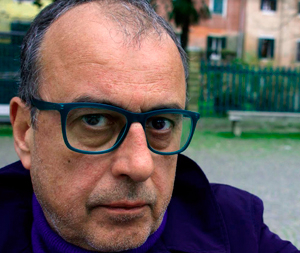- 14th EDITION 2022 / 2023
- 13th EDITION 2021 / 2022
- 12th EDITION 2020 / 2021
- 11th EDITION 2019 / 2020
- 10th EDITION 2018 / 2019
- 9th EDITION 2017 / 2018
- 8th EDITION 2016 / 2017
- 7th EDITION 2015 / 2016
- 6th EDITION 2014 / 2015
- 5th EDITION 2013 / 2014
- 4th EDITION 2012 / 2013
- 3rd EDITION 2011 / 2012
- 2nd EDITION 2010 / 2011
- 1st EDITION 2009 / 2010
Antoni Abad IN RESiDENCE at the School Poeta Maragall
Antoni Abad y la Venecia que no se ve. EL PAÍS

Antoni Abad (Lleida, 1956) graduated in 1979 in the History of Art from the Universitat de Barcelona and holds a European Media Master’s Degree, awarded by the Universitat Pompeu Fabra in 1997. In 2006, he was awarded the National Prize for the Visual Arts by the Government of Catalonia and the Golden Nica in the Digital Communities category of the Prix Ars Electronica in Linz (Austria).
He has shown work in the biennial art festivals in Venice (1999 and 2017), Lima (1999), Seville (2004 and 2008), Mercosul Porto Alegre (2009) and Berlin (2016). His projects have been presented at numerous museums and galleries, among them the Reina Sofía, La Casa Encendida and Matadero in Madrid; the MACBA, Centre d’Art Santa Mònica and Fundació Suñol in Barcelona; the New Museum and P.S.1. in New York; the Hamburger Bahnhof in Berlin and the ZKM in Karlsruhe in Germany; the Musac in León; the Centre d’Art Contemporain in Geneva; the Museo de Arte Moderno in Buenos Aires; the Laboratorio de Arte Alameda and Centro Cultural de España in Mexico; and the Centro Cultural São Paulo and Pinacoteca do Estado de São Paulo in Brazil.
Between 2004 and 2014, he focused his activity on Web-based communication projects involving the use of mobile phones by groups at risk of exclusion in Mexico City, Lleida, León, Madrid, Barcelona, San José (Costa Rica), São Paulo, Geneva, Manizales (Colombia), the Algerian Desert, New York and Montreal. Taxi drivers, immigrants, refugees, demobilised guerrilla fighters and people with reduced mobility were active participants in these initiatives, publishing their own audiovisual chronicles on the www.megafone.net website on a daily basis.
In the autumn of 2014, while in Rome at the Academia de España en Roma, he embarked on the development of his BlindWiki project, a prototype Web-based citizen network for people who are blind or have impaired vision. The participants use mobile phones to make geolocated audio recordings of their everyday experiences in the city. Using the BlindWiki app, mobile phones are able at all times to access previously posted recordings, which reflect the urban landscape as it is experienced by people with visual diversity. The project fosters the collaborative creation of a public sensory map that can be extended to other cities and which the blind, visually impaired and society as a whole are able to make use of. In addition to Rome, the BlindWiki project was run in 2015 in Sydney and in 2016 at the 9th Berlin Biennale and in Breslau (Poland) as part of the city’s events as the European Capital of Culture. Participants’ contributions can be accessed using the mobile app on the streets of these cities and via the project website, www.blind.wiki.
Biography made in 2018
School Poeta Maragall
institutmaragall.catThis is the fourth time it has participated in the programme (Xavier Bobés, L'Automàtica and Josep Pedrals took up previous residencies at the school) and it is doing so with a group of pupils in the fourth year of compulsory secondary education.
/
The Institut Poeta Maragall (Antiga Esquerra de l’Eixample) was the first mixed secondary school in Barcelona and was also the first in the city to offer post-compulsory secondary education taught as evening classes (1955). Created in 1932 at the height of the Second Republic, its seed was the pre-existing Institut Infanta María Cristina for girls. Its current building dates from 1967. The art education offered in the sixth form at the Institut Poeta Maragall includes the visual arts, image and design, the performing arts, music and dance.
Presentation written in 2018
Participants
Students (4th ESO)
Maria Sol Alarcón Acuña, Ainara Aldecosea Lobelcho, Rita Andrés Pampalona, Lucía Borge Rey, Simón Ayekán Caris Aguilera, Sofia Leigh Acedo, Milana Litvinova, Núria Liang Molina Maltas , Ainhoa Mercedes Morgan Arcos, Mildred Moya Zambrana , Mildred Carolina Penella Santana, Jana Bao Romeo Altimis, Edson Sanchez, Alexand Vila Coll, Xinyi Zhang and Diana Mirzoiants
Teacher
Pilar Domènech
Curation and coordination
A Bao A Qu
Management:
Institut de Cultura de Barcelona
Consorci d’Educació de Barcelona
